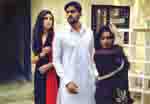 The gang culture has suddenly become the hot topic in Bangladeshi films, featuring young stylish men working as the dependable cohort of social Godfathers. Of course, the young men are always good at heart, never disrespecting women, always finding time to play with children and hardly touching alcohol. They may well be saints working for the wrong side. So, in the recently released Dhallywood film Tarakata, we have such an immaculate person called Ibrahim, whose name sends shivers across all goons around the city. When Ibrahim appears as the avenger, there is an echo in the background – Ibrahim, Ibrahim, Ibrahim. That’s done for cinematic impact!
The gang culture has suddenly become the hot topic in Bangladeshi films, featuring young stylish men working as the dependable cohort of social Godfathers. Of course, the young men are always good at heart, never disrespecting women, always finding time to play with children and hardly touching alcohol. They may well be saints working for the wrong side. So, in the recently released Dhallywood film Tarakata, we have such an immaculate person called Ibrahim, whose name sends shivers across all goons around the city. When Ibrahim appears as the avenger, there is an echo in the background – Ibrahim, Ibrahim, Ibrahim. That’s done for cinematic impact!
In reality, thugs hardly have such decent names with titles like Haat Kata Aslam (Aslam with one hand missing), Murgi Kamal (chicken Kamal because at one point in life he sold chicken) or Bichi Polash (because he has a bullet tied around his neck) to identify them.
But our Ibrahim is none other than Arefin Shuvo who is not only a top terror but also a fashion icon of sorts.
His style is to wear fancy kurtas over denim pants. Sunglasses are essential! His ‘chela group’ (disciples) comprises of talkative jokers and reticent robots.
Ibrahim did not enter the world of crime willingly. He was falsely implicated in a murder. But stepping into the underworld has robbed him of his blissful life with his sister. The sis by the way is played by once Dhallywood queen Moushumi, who has million layers of make-up on her face. Even in moments of despair, the look is intact!
The love between brother and sister is exaggerated like many other things in the film. At one point, you begin to wonder if beneath this sibling obsession also hides an undertone of ancient Egyptian eroticism. Sorry if it offends anybody but that’s what I felt!
Almost half of this film is the pining and groaning as to why Ibrahim chose crime and eventually lost all affection from his sister. What a pain! It seems Moushumi’s role was deliberately expanded to give her more screen time.
In an emotional moment on the phone with her estranged brother, the clock in one shot shows quarter past seven and in the next, it’s three thirty…..we still have a long, long way to go when it comes to dealing with anachronisms.
Then there is the Godfather, played by Ejajul Islam. Wearing a Jinnah topi, this guy speaks Bangla with a non-Bengali twang, often using profound Urdu words. The time is rife for demonizing everything that relates to Pakistan and possibly that is the main motive here.
The don is a Muslim but that does not stop him from holding alcohol fuelled Mujra sessions with navel exposing women, dancing to the once hit song of Dhallywood: Rupe amar agun jole, joubon bhora onge (My beauty is fiery as my body is at the peak of youth).
By the way, that is the item number of the film! Explicit dance numbers accompanied by songs liberally using words like Joubon (youth), Rosh (juice), Amar Agun (my fire), Makhon (butter) Modhu (honey) have become staple in local movies. We follow India – that’s a fact.
Inside the dark hall, a couple was seated beside me and the girl was upset since her boyfriend or husband was mesmerised by the naval onslaught on the screen. ‘Look at me, I am better; I will also give you a private dance session at home,’ the girl said to the boy.
Just kidding! I just made that up but she was not thrilled to see her guy salivating at someone else.
Also, when will film makers learn that whisky is not served in a wine glass; it’s drunk from a whisky glass, which is almost same as other glasses. Perhaps, the stem glass reinforces the ‘evil’ act of drinking.
‘Chi, chi, chi tumi modh kheye eshecho’ (shame you have drunk alcohol!) – is permanently etched in Bangla movie world as the ultimate line of denunciation! This line is responded inevitably with –‘Ha, ha ami modh kheye esehchi!’ (yes! Yes! I have taken alcohol)
Anyway, in between all this family drama and mafia culture, there is Bidya Sinha Mim, the bar singer who has to look after an indisposed father. She is resplendent in colourful clothes but cannot pay her rent on time. It’s the same old story – the landlord, an obese man with ill-manners, torments her. Seeing her predicament, our hero, top mastan Ibrahim appears in the scene!
Again, the echo in the back Ibrahim, Ibrahim, Ibrahim….
It’s love at first sight! Who cares if she is a bar singer! From the background, Ibrahim pulls strings to make his love the number one singer in town and then, by coincidence, becomes her bodyguard plus secretary.
People want her autograph, some even want private sessions. They are looking for songs and more….don’t blame them.
No she does not sing for private parties….her body is preserved for one man. Please spare us the horse excreta!
In the meantime, Ibrahim’s niece is abducted, the sister carries on with her weeping on screen and I am thinking: ar partasi na re, (can’t take it anymore). So I leave the hall, run for the exit. Out in the open, there is only one echo – ‘pala, taratri pala….’
-With New Age input




















